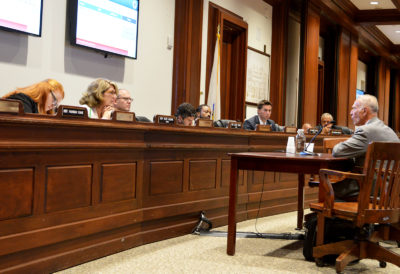
The Massachusetts Medical Society voted to change its longstanding oppositional position to “medical aid-in-dying,” the group’s preferred term for physician-assisted suicide, to a “neutral” stance at its interim meeting over the weekend.
The new stance will allow the organization, a statewide association for physicians and medical students, to act as a scientific resource for legislation aiming to legalizing the practice, the association wrote in a press release Saturday.
In September, the proposed bill for medical aid-in-dying was heard by the Joint Committee on Public Health, The Daily Free Press reported. The deadline for the committee to act on the bill is Feb. 7.
The change in stance follows the release of an anonymous survey sent out by the society to its member physicians polling their opinion on medical aid-in-dying Friday, one day prior to the group’s House of Delegates’ final vote on the matter. The survey results reflected support within the group for current medical aid-in-dying legislation by a 2-1 margin, according to a press release from the organization.
Anne Fox, the president of Massachusetts Citizens for Life, said if legislation for medical aid-in-dying was passed, it would drastically alter the way in which doctors interact with terminally ill patients and also change how patients discuss medical care with doctors.
“If something is illegal, most people don’t consider it,” Fox said. “If it’s legal, they think it’s right, and of course, legal and right are two separate things.”
Fox said she is concerned less money will be placed into the health care of terminally ill patients because end-of-life treatment would be prioritized over long-term health care.
Currently, medical aid-in-dying is illegal in Massachusetts, but the society reversing its stance may cause a change in action at the State House, Fox said.
“The fact that they took a neutral position, I believe that they are saying, well it’s not up to us to tell people what to do,” Fox said. “That still leads it up to the legislature, and it leads to one fewer organization lobbying against doctor prescribed suicide.”
Marie Manis, the Massachusetts campaign director for Compassion and Choices, an organization that works on care and options for people at the end of their life, said she thinks the society’s decision is great for the residents of Massachusetts.
Manis said she is optimistic about the impact of the announcement on the legislature and said voters in the state want medical aid-in-dying as a viable option.
Several Boston residents said they support the ability for people to opt for medical aid-in-dying.
Samantha Rawlins, 29, of the South End, said the decision to have this procedure done should remain in the patient’s hands, and if that is not a viable option, then the patient’s closest relatives should be allowed to make the call.
“The decision shouldn’t be anyone else’s,” Rawlins said. “I think it’s important to protect the patient’s ability to choose and for the patient’s doctor to be able to help them move forward with whatever they decide.”
Pete Carolan, 44, of Beacon Hill, said although he doesn’t have a strong opinion on medical aid-in-dying, patients should be the ones to decide what happens to them, not the government.
“If someone is living with a great deal of discomfort, they shouldn’t have to keep living through that if they have the choice not to,” Carolan said. “Doctors are there to help their patients recover, so I get why they’d try to do everything to keep them alive and not pull the plug, but if there really is nothing they can do to save them and they’ll just be living in that uncomfortable state, the doctor could be helping them through assisted-suicide.”
Jordan Collins, 53, of Allston, said through watching his cousin suffer through a fight against cancer and eventually die from it, having the choice to pick medical aid-in-dying is important.
“I just remember thinking — because you think a lot about these kinds of things when you’ve got a loved one who’s sick — that if it was me, I don’t think I could handle living in that much pain like he did,” Collins said. “If I had the choice, I’d want to end it. Not everyone’s as strong as my cousin — I know I probably couldn’t handle what he went through.”
Hannah Schoenbaum contributed to the reporting of this article.






















































































































